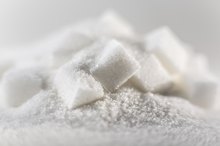What does fact checked mean?
At Healthfully, we strive to deliver objective content that is accurate and up-to-date. Our team periodically reviews articles in order to ensure content quality. The sources cited below consist of evidence from peer-reviewed journals, prominent medical organizations, academic associations, and government data.
- Mayo Clinic.com; Dietary Fiber: Essential for a Healthy Diet; November 5, 2010
- Medline Plus; Soluble vs. Insoluble Fiber; Jennifer K. Mannheim, ARNP; July 21, 2010
The information contained on this site is for informational purposes only, and should not be used as a substitute for the advice of a professional health care provider. Please check with the appropriate physician regarding health questions and concerns. Although we strive to deliver accurate and up-to-date information, no guarantee to that effect is made.
What Are Soluble Carbohydrates?
Carbohydrates should make up the bulk of a healthy diet. Approximately 45 to 65 percent of your total calories should come from a carbohydrate source. A healthy carbohydrate is a soluble fiber. Soluble fiber is a healthy and smart food to eat. It can help you lose weight and can even reduce your risk for chronic diseases.
Carbohydrates
Carbohydrates encompass many types of foods, including grains, milk, fruit sugars and fibers. A soluble carbohydrate refers to the fiber category of carbohydrates. There are two types of fibers found naturally: soluble and insoluble. A soluble carbohydrate is a soluble fiber 3.
- Carbohydrates encompass many types of foods, including grains, milk, fruit sugars and fibers.
- A soluble carbohydrate refers to the fiber category of carbohydrates.
Characteristics
Water Soluble Fiber Foods
Learn More
Fiber, by nature, is indigestible. This means although your body can break it down, it cannot absorb it. When soluble fiber passes through your digestive system, bacteria inside of your intestines go to work on it. Soluble fiber turns into a gummy substance that bonds with water. Soluble fiber is termed as such because it can dissolve in water.
- Fiber, by nature, is indigestible.
- Soluble fiber turns into a gummy substance that bonds with water.
Benefits of Soluble Carbohydrates
A soluble carbohydrate can help to control your weight, your blood glucose and your cholesterol. Since soluble fiber absorbs water, it fills up your gut. As it travels through your digestive system, its form increases in size. This helps to reduce your hunger cravings and control your eating, which may lead to weight loss. Soluble fiber, also because of its form during digestion, can block the absorption of other nutrients. In doing so, other carbohydrates that might spike your blood glucose do not enter your bloodstream. Instead, there is a modest rise in glucose over time that can offer you better blood sugar control. This is why soluble fiber can help to lower your cholesterol. It blocks the absorption of fat and cholesterol by your intestines, as well.
- A soluble carbohydrate can help to control your weight, your blood glucose and your cholesterol.
Sources and Recommendations
The Carb Count in Carrots
Learn More
According to the Mayo Clinic website, recommendations for fiber intake vary by age and gender 2. For a male under 50 years old, fiber intake should be about 38 g per day. For a female under 50 years old, fiber intake should remain around 25 g per day. A male over 50 needs 30 g per day and a female over 50 needs 21 g per day. Sources of soluble fiber include:
- oats
- nuts
- seeds
- beans
- legumes
- fruits
- vegetables
- According to the Mayo Clinic website, recommendations for fiber intake vary by age and gender 2.
- For a female under 50 years old, fiber intake should remain around 25 g per day.
Related Articles
References
- "Nutrition: Concepts and Controversies"; Frances Sizer and Eleanor Whitney; 2004.
- Mayo Clinic.com; Dietary Fiber: Essential for a Healthy Diet; November 5, 2010
- Medline Plus; Soluble vs. Insoluble Fiber; Jennifer K. Mannheim, ARNP; July 21, 2010
- Fiber content of foods in common portions. Harvard University Health Services. Website: http://huhs.harvard.edu/assets/File/OurServices/Service_Nutrition_Fiber.pdf. Accessed December 10, 2015.
- Rolfes SR, Whitney E. Understanding Nutrition, 13th ed 2013.
- Third Report of the National Cholesterol Education Program (NCEP) Expert Panel on Detection, Evaluation, and Treatment of High Blood Cholesterol in Adults (PDF), July 2004, The National Institutes of Health: The National Heart, Lung, and Blood Institute.
Writer Bio
Laura Niedziocha began her writing career in 2007. She has contributed material to the Stoneking Physical Therapy and Wellness Center in Lambertville, N.J., and her work has appeared in various online publications. Niedziocha graduated from Temple University with a Bachelor of Science in exercise science. She also has her Associate of Arts in communications from the Community College of Philadelphia.









